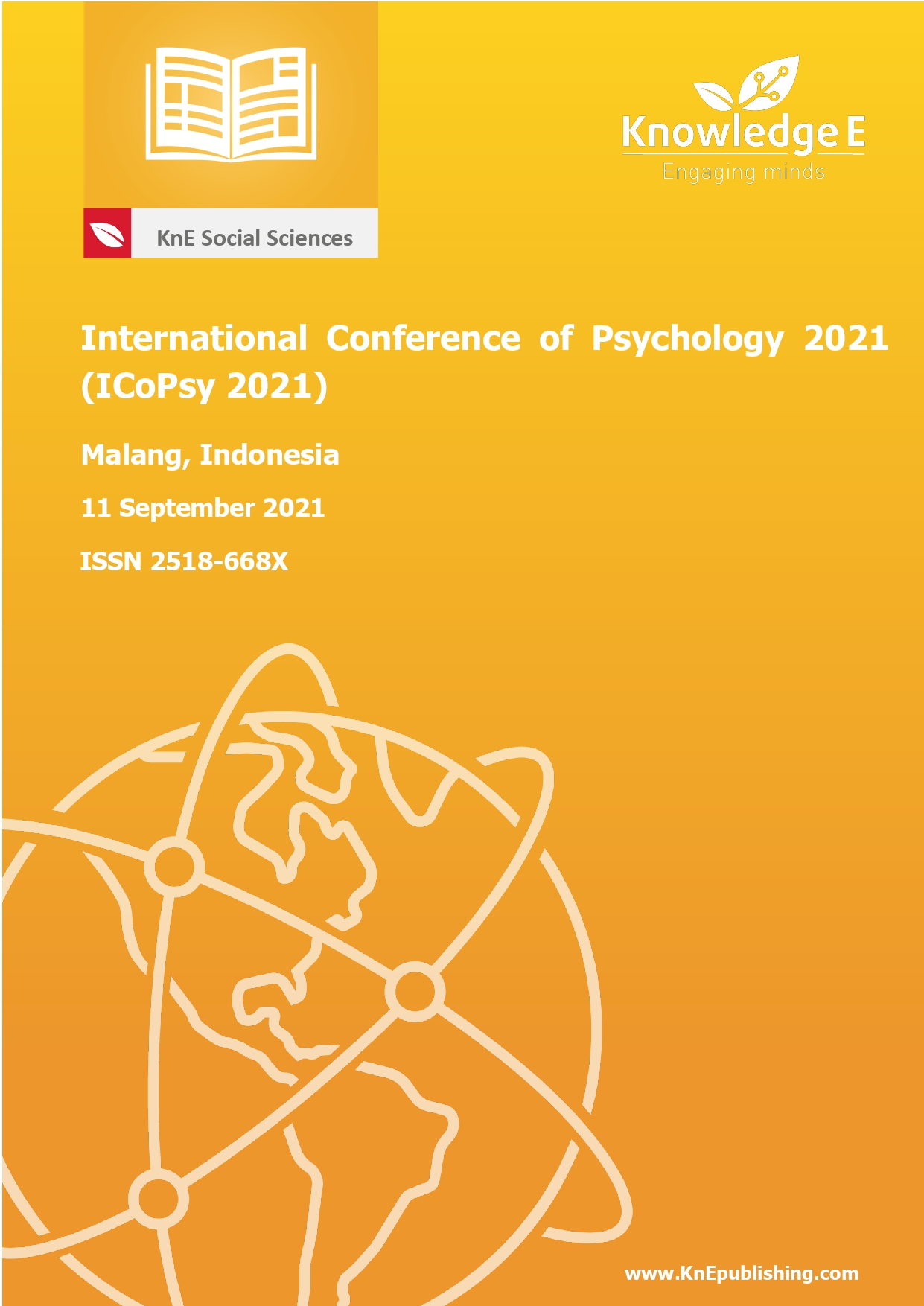Correlation Between Self-Adjustment and Psychological Well-Being of Fathers
DOI:
https://doi.org/10.18502/kss.v7i1.10202Abstract
Psychological well-being is the condition of individuals who are able to assess themselves and others positively, be able to make decisions independently, and have clear life goals. Individuals who have good psychological well-being will feel happy and satisfied with the life they have. Psychological well-being is related to the individual’s personality, while the personality of each individual will be different in responding to self-adjustment and will appear different according to how the individual adjusts. Based on this, psychological well-being is influenced by self-adjustment. A man who is a father, husband, and head of family who can adjust well will have a harmonious and prosperous life in his marriage. This research applied a correlational quantitative method with an independent variable of self-adjustment and a dependent variable of psychological well-being. Data were collected using a psychological well-being scale and a self-adjustment scale. 100 fathers with an age range from 19 to 40 years were recruited through purposive sampling. Data were analyzed through the Pearson product-moment correlation test. The correlation coefficient value in this study was 0.601 with a p-value of 0.001 (p < 0.05). These findings showed that there was a significant positive relationship between self-adjustment and psychological well-being in fathers.
Keywords: self-adjustment, psychological well-being, fathers
References
[2] Ryff CD. Happiness is everything, or is it? Explorations on the meaning of psychological well-being. Journal of Personality and Social Psychology. 1989;57(6):1069. https://doi.org/10.1037/0022-3514.57.6.1069
[3] Schmutte PS, Ryff CD. Personality and well-being: Reexamining methods and meanings. Journal of Personality and Social Psychology. 1997;73(3):549– 559. https://doi.org/10.1037/0022-3514.73.3.549
[4] Ayu, M. P. The big five personality dan penyesuaian diri pada menantu perempuan yang tinggal bersama ibu mertua [Doctoral dissertation]. Malang: University of Muhammadiyah Malang; 2017.
[5] Schneiders AA. Personal adjustment and mental health. New York: Rinehart and Winston Inc; 1964.
[6] Ubaidillah, Azrul (2014) Hubungan antara kesejahteraan psikologis dan penyesuaian diri terhadap stres akademik pada mahasiswa baru Fakultas Psikologi Universitas Islam Negeri Maulana Malik Ibrahim Malang tahun akademik 2013. [Undergraduate thesis] Malang: Universitas Islam Negeri Maulana Malik Ibrahim. http://etheses.uin-malang.ac.id/id/eprint/734
[7] Hurlock EB. Psikologi perkembangan suatu pendekatan sepanjang rentang kehidupan (Ed. ke-5). Jakarta: Penerbit Erlangga; 1980.
[8] Sugiyono, S. Metode penelitian kuantitatif kualitatif dan R&D. Bandung: Alfabeta; 2019. [9] Eva N, Bisri M. Dukungan Sosial, Religiusitas, dan Kesejahteraan Psikologis Mahasiswa Cerdas Istimewa. In: Proseding Seminar Nasional Klinis. Malang, Indonesia: Fakultas Pendidikan Psikologi; 26 August 2018.
[10] Kinanti RR. Hubungan antara psychological well-being dengan penyesuaian diri istri tentara berpangkat Tamtama dan Bintara di Batalyon 502 Jabung [Undergraduate Thesis]. Malang: Fakultas Pendidikan Psikologi Universitas Negeri Malang; 2019.
[11] Firdhausa RI. Pengaruh interaksi sosial terhadap kesejahteraan psikologis pada purnawirawan pepabri Kecamatan Turen Kabupaten Malang [Undergraduate Thesis]. Malang: Fakultas Pendidikan Psikologi Universitas Negeri Malang; 2020.
[12] Kurniawan SR. Hubungan antara dukungan sosial dengan kesejahteraan psikologis pada mahasiswa rantau [Undergraduate Thesis]. Malang: Fakultas Pendidikan Psikologi Universitas Negeri Malang; 2020.
[13] Ryff CD, Keyes CLM. The structure of psychological well-being revisited. Journal of Personality and Social Psychology. 1995;69(4):719–727. DOI:10.1037/0022- 3514.69.4.719
[14] Trianto H. S., Soetjiningsih C. H., Setiawan., A. (2020) . Faktor pembentuk kesejahteraan psikologis pada milenial. Philanthropy Journal of Psychology, 4(2), 105–117. http://dx.doi.org/10.26623/philanthropy.v4i2.2731
[15] Darmawanti IN. Kontribusi dukungan sosial teman sebaya terhadap penyesuaian sosial peserta didik [Doctoral Dissertation]. Bandung: Universitas Pendidikan Indonesia; 2016.
[16] Maslihah S. Faktor yang mempengaruhi kesejahteraan subyektif anak didik lembaga pembinaan khusus anak. Jurnal Psikologi Insight. 2017;1(1):82-94. https://doi.org/10.17509/insight.v1i1.8446
[17] Sunarto, H and Hartono, N.B.A. 2008. Perkembangan Peserta Didik. Jakarta: Rineka Cipta.

